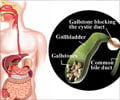A drug used to lower cholesterol and help prevent cardiovascular disease may help improve bone healing, shows a new animal model based study.
A new animal model based study has found that a drug used to lower cholesterol may also help in healing bones.
Researcher at the Max Planck Institute for Molecular Genetics said that the finding of the drug Lovastatin as a booster will be of great interest to NF1 patients and their physicians.The study was conducted using an animal model of neurofibromatosis type 1 (NF1).
Many NF1 patients suffer from bowing, spontaneous fractures and pseudarthrosis (incomplete healing) of the tibias (shinbones).
Mateusz Kolanczyk from Stefan Mundlos' laboratory in the Max Planck Institute for Molecular Genetics, Berlin, led a team that examined lovastatin's ability to prevent pseudarthrosis in a new animal model of human NF1 disease.
Present therapies are often futile when applied to pseudarthrosis of the tibia; in some cases, amputation is the only option.
To better understand this problem, Kolanczyk and his colleagues developed this mouse model.
Advertisement
The researchers drilled a 0.5mm hole in the tibia of anaesthetised mice.
Advertisement
The process of bone repair was examined 7, 14 and 28 days post-injury.
The researchers found that the mice given the statin treatment had marked improvements in bone healing compared to the control animals.
"Lovastatin appears to accelerate cortical bone repair primarily by enhancing new bone formation within the bone marrow cavity and by replacing fibro-cartilaginous tissue in the injury site with mineralised bone matrix," the authors said.
"Our results suggest the usefulness of lovastatin, a drug approved in 1987 for the treatment of high cholesterol, in the treatment of neurofibromatosis-related fracture healing abnormalities," Kolanczyk said.
The study is published in the open access journal BMC Medicine.
Source-ANI
RAS/L













